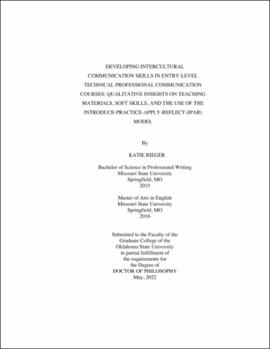| dc.contributor.advisor | Cheng, An | |
| dc.contributor.author | Rieger, Katie | |
| dc.date.accessioned | 2023-03-13T20:47:19Z | |
| dc.date.available | 2023-03-13T20:47:19Z | |
| dc.date.issued | 2022-05 | |
| dc.identifier.uri | https://hdl.handle.net/11244/337085 | |
| dc.description.abstract | I provide considerations for TPC instructors and programs regarding developing students' IC skills. I start by examining key conversations and found that issues teaching IC arise when frameworks, texts, and/or individuals do not define key terms related to culture and IC. To address this issue and create a strong foundation, I establish some of the terms that I use throughout this project, such as Small culture, intercultural communication (IC), and soft skills (SSs). I argue that IC is a type of SS, and SSs require development in three domains: cognitive, attitudinal, and behavioral. | |
| dc.description.abstract | I then present three studies. First, in chapter three, I conduct a content analysis of textbooks in the field because textbooks are the primary tool used by many instructors, especially those who may feel uncomfortable teaching IC (Brunsmeier, 2017; Matsuda and Matsuda, 2011). I establish that textbooks may have some issues (such as defining culture and using reductionistic examples). I argue that while textbooks provide several opportunities for developing the cognitive domain (related to IC information), instructors should add supplemental activities that address the attitudinal and behavioral domains. | |
| dc.description.abstract | In chapter four, I present a model (known as the Introduce - Practice - Apply - Reflect (IPAR) model) that can potentially address all three domains and can be used to develop students' IC skill. I argue that this model can address each domain; however, I also argue and suggest that instructors should be intentional by including several opportunities for attitudinal development. | |
| dc.description.abstract | In chapter five, I present findings from a study that used the IPAR model. This study focuses on students' perceptions of how helpful certain activities were to their IC development. Most students rated the activities where they worked with individuals outside of the academy as the most helpful (interviewing and a client-based project). | |
| dc.description.abstract | In chapter six, I discuss how these projects build upon previous knowledge, and I argue that this project offers several additions to the field. Some of those additions include key definitions, the IPAR, and information related to how one can develop students' IC skills rather than simply teach about IC. | |
| dc.format | application/pdf | |
| dc.language | en_US | |
| dc.rights | Copyright is held by the author who has granted the Oklahoma State University Library the non-exclusive right to share this material in its institutional repository. Contact Digital Library Services at lib-dls@okstate.edu or 405-744-9161 for the permission policy on the use, reproduction or distribution of this material. | |
| dc.title | Developing intercultural communication skills in entry-level technical professional communication courses: Qualitative insights on teaching materials, soft skills, and the use of the introduce-practice-apply-reflect (IPAR) model | |
| dc.contributor.committeeMember | Daniel, Josh | |
| dc.contributor.committeeMember | Sicari, Anna | |
| dc.contributor.committeeMember | Thompson, Penny | |
| osu.filename | Rieger_okstate_0664D_17542.pdf | |
| osu.accesstype | Open Access | |
| dc.type.genre | Dissertation | |
| dc.type.material | Text | |
| dc.subject.keywords | intercultural communication | |
| dc.subject.keywords | professional communication | |
| dc.subject.keywords | soft skills | |
| thesis.degree.discipline | English | |
| thesis.degree.grantor | Oklahoma State University | |
